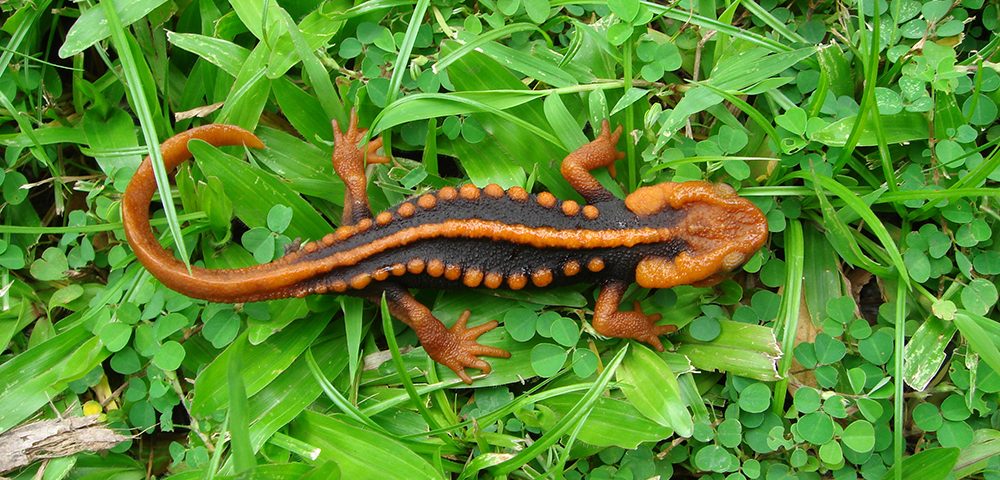A rainbow-headed snake resembling David Bowie’s Ziggy Stardust character, a dragon-like lizard and a newt that looks like a Klingon from the movie Star Trek are three of the 163 new species discovered recently in the Greater Mekong region, according to a report released today by World Wildlife Fund (WWF). The report, Species Oddity, documents the work of hundreds of scientists who discovered nine amphibians, 11 fish, 14 reptiles, 126 plants and three mammals in Cambodia, Laos, Myanmar, Thailand and Vietnam.
The discoveries also include a rare banana species from Thailand, a tiny frog from Cambodia and a gecko with pale blue spotted skin and piercing dark eyes that was found hiding among the remote mountains of Laos. This brings the total new species of plants, birds, mammals, reptiles, fish and amphibians discovered in the region to 2,409 since WWF began compiling new species reports in 1997.
“The Greater Mekong region is a magnet for the world’s conservation scientists because of the incredible diversity of species that continue to be discovered here,” said Jimmy Borah, Wildlife Programme Manager for WWF-Greater Mekong. “These scientists, the unsung heroes of conservation, know they are racing against time to ensure that these newly discovered species are protected.”
Highlights of the report include:
• A rainbow-headed snake, Parafimbrios lao, that has been likened to David Bowie’s Ziggy Stardust character. It was found among steep karst cliffs in Northern Laos and while originally thought to exist in only one location, it has since been seen in a second one, increasing its chances of survival.
• The Phuket Horned Tree Agamid, Acanthosaura phuketensis, has a fearsome set of horns on its head and spine and was found among the few remaining forest patches on the popular Thai tourist island of Phuket. It is threatened by rapid habitat loss and collection for the pet trade.
• A rare banana species discovered in Northern Thailand, Musa nanensis, is already considered critically endangered due to increasing deforestation and the fact that only a handful of individual plants have been seen. However, the recent discovery of another small population has given researchers hope for the species.
• A new frog species from Cambodia and Vietnam, Leptolalax isos, has a name that is about as long as its body. At 3 cm, this diminutive amphibian is threatened by some major forces – logging, agricultural expansion and hydroelectric projects.
• A newt discovered in Thailand’s Chiang Rai Province, Tylototriton anguliceps, has stunning red and black markings that resemble a Klingon from the movie Star Trek. Its porous skin makes it especially sensitive to pesticides, the main threat alongside deforestation of its habitat.
• A gecko discovered in the remote karst mountains of Laos by a team of scientists who often had to rely on water dripping off stalactites in caves. Gekko bonkowski i is believed the discovery may hold the key to understanding lizard evolution in the Annamite Mountain Range.
• A plant from the Chin Hills of North-western Myanmar that has two petal coverings (sepals) resembling mouse ears. Discovered on Mount Victoria, Impatiens kingdon-wardii is a reminder that Myanmar’s rich biodiversity needs protection as the country rapidly opens up to development.
• A bat, Murina kontumensis, found in the Central Highlands of Vietnam with thick and woolly fur on its head and forearms.
The Greater Mekong region is under intense development pressure from mines to roads to dams, threatening the survival of the natural landscapes that make it so unique. Poaching for bushmeat or the multi-billion dollar illegal wildlife trade puts additional pressure on the region’s wildlife, meaning many species could be lost before they are even discovered.
“Many collectors are willing to pay thousands of dollars or more for the rarest, most unique and most endangered species, often buying them at the region’s illegal wildlife markets, especially in the Golden Triangle region where China, Laos, Thailand and Myanmar meet,” Borah said. “To save them, it’s crucial that we improve enforcement against poaching and close illegal wildlife markets as well as the tiger and bear farms that openly flaunt wildlife laws.”
WWF recently launched an ambitious project to disrupt the trade by closing down the biggest markets in the Greater Mekong region. Working with partners and across borders, WWF will attempt to significantly reduce illegal trade in key threatened species such as elephants, tigers and rhinos by promoting species protection legislation, supporting effective transboundary cooperation and improving law enforcement effectiveness at key border crossings.
The full report can be seen at: http://www.panda.org/species_oddity
Enviroshop is maintained by dedicated NetSys Interactive Inc. owners & employees who generously contribute their time to maintenance & editing, web design, custom programming, & website hosting for Enviroshop.
